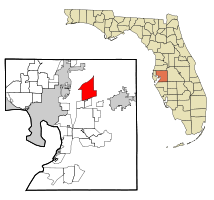Thonotosassa, Florida
| Thonotosassa, Florida | |
|---|---|
| CDP | |
 Location in Hillsborough County and the state of Florida |
|
| Coordinates: 28°3′22″N 82°17′34″W / 28.05611°N 82.29278°WCoordinates: 28°3′22″N 82°17′34″W / 28.05611°N 82.29278°W | |
| Country | United States |
| State | Florida |
| County | Hillsborough |
| Area | |
| • Total | 18 sq mi (46.6 km2) |
| • Land | 16.7 sq mi (43.2 km2) |
| • Water | 1.3 sq mi (3.4 km2) |
| Elevation | 33 ft (10 m) |
| Population (2010) | |
| • Total | 13,014 |
| • Density | 338.4/sq mi (130.7/km2) |
| Time zone | Eastern (EST) (UTC-5) |
| • Summer (DST) | EDT (UTC-4) |
| ZIP code | 33592 |
| Area code(s) | 813 |
| FIPS code | 12-71725 |
| GNIS feature ID | 0292232 |
Thonotosassa is a census-designated place (CDP) in Hillsborough County, Florida, United States. The population was 13,014 at the 2010 census.
The name Thonotosassa comes from the Seminole-Creek words thlonto and sasse, meaning the place was a source of valuable flint. Following the establishment of Fort Brooke in 1824 in what is now Tampa, a road that ran northwest of Lake Thonotosassa was built between Fort Brooke and Fort King in Ocala. This road became known as the Fort King Road, which today is crossed in several locations by US Route 301. Nevertheless, the presence of a Seminole village largely discouraged whites from moving into the area. After the Second Seminole War ended in 1842, whites began to settle.
In 1893, the Tampa and Thonotosassa Railroad opened a 13-mile route between the two growing communities. This line today no longer extends into Thonotosassa, its northern tracks having been removed along with the town depot by the 1980s; but its southern portion remains a busy industrial spur, joining with the CSX main line at Neve Wye.
Among other areas for recreation for the youth is the Morris Bridge Road area and its Nature's Classroom.
Thonotosassa is located at 28°3′22″N 82°17′34″W / 28.05611°N 82.29278°W (28.056135, -82.292663).
...
Wikipedia
